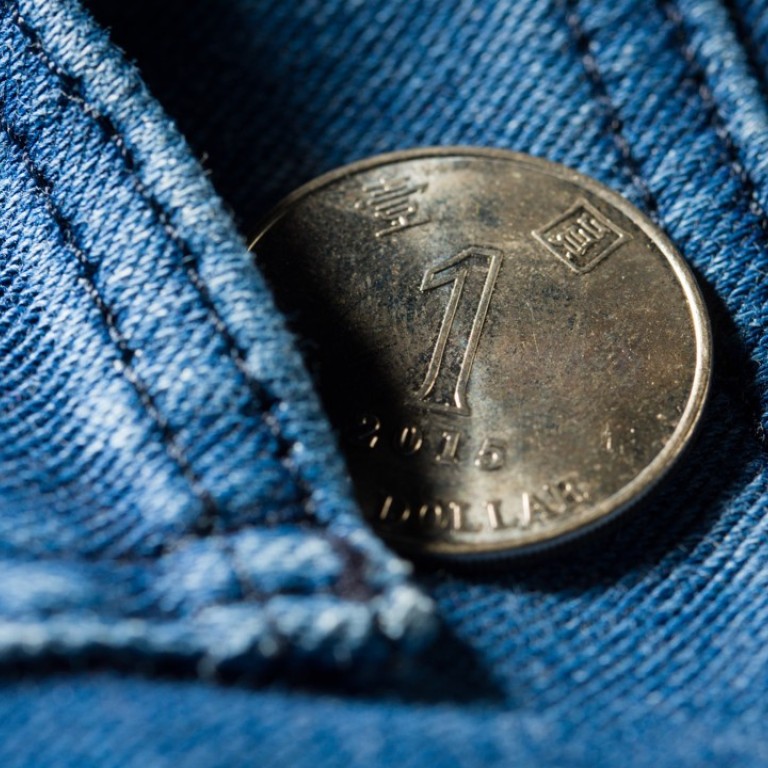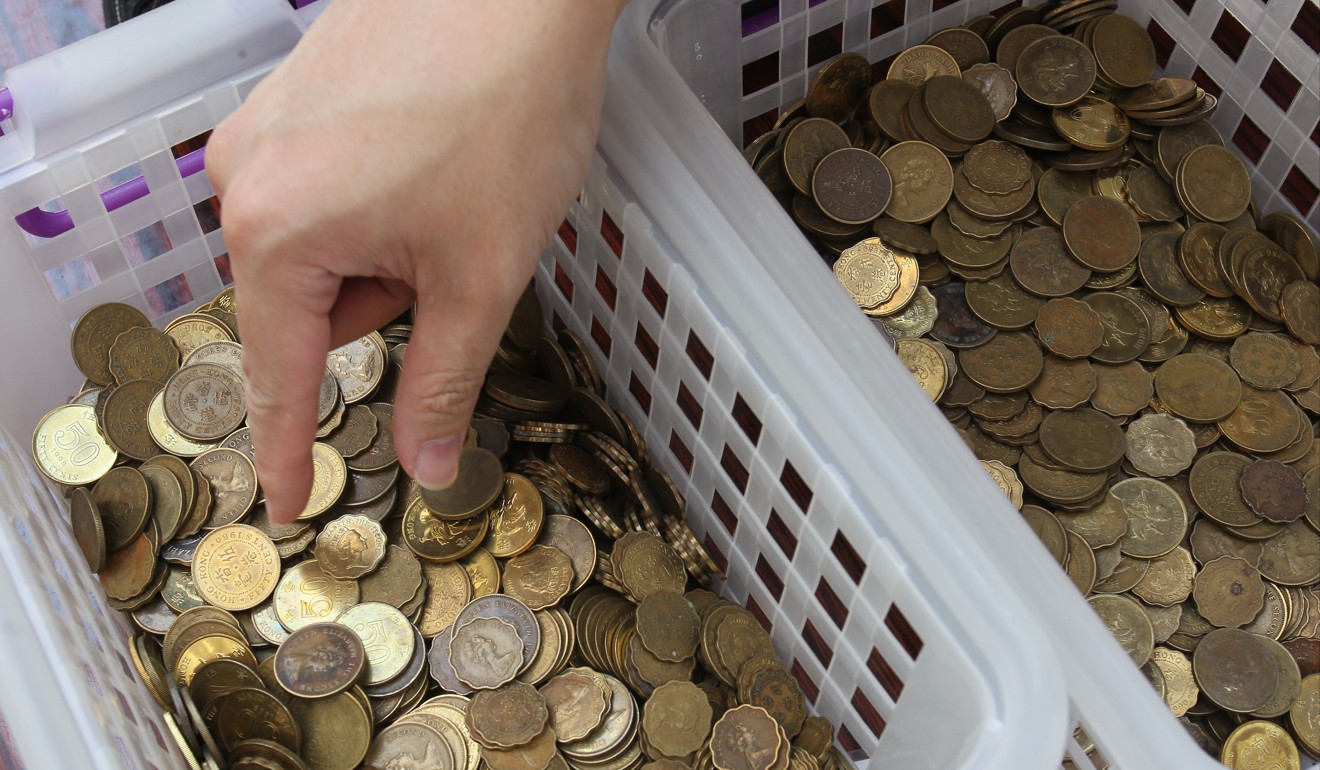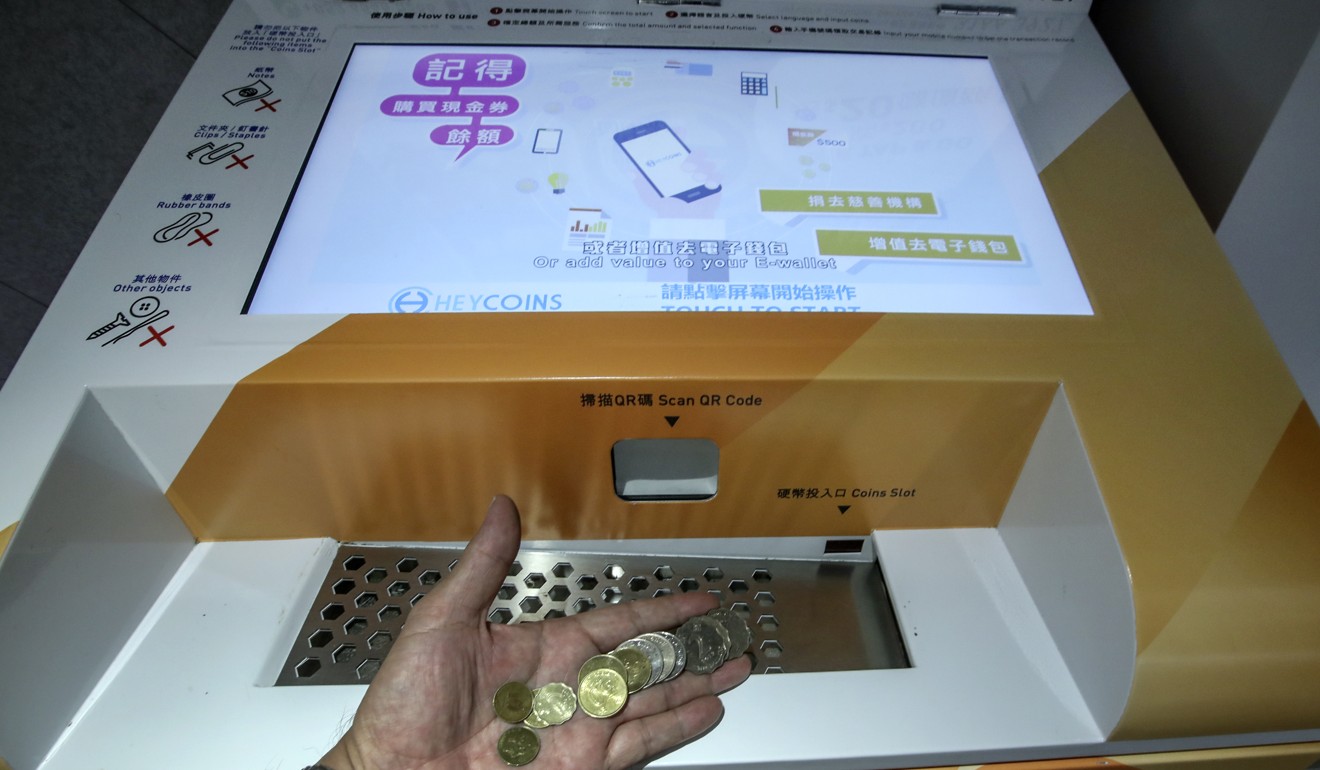
The Hong Kong students cashing in on the spare change you have in your pocket
Heycoins system operates citywide and allows people to convert their loose coins into electronic currency
Do you have a heap of small coins at home but don’t know what to do with them? You’re not alone. Thousands of Hongkongers store jars and boxes of 10, 20 and 50 cent pieces, but never quite get around to turning them into something more useful.
The Hong Kong Monetary Authority (HKMA) says there is HK$6.7 billion (US$858 million) worth of coins circulating around the city, but with many stores choosing not to accept the coins, and banks charging people to deposit them in their accounts, that leaves millions of dollars sitting in shoe boxes, jars, and down the backs of people’s sofas.
A Coin Collection Programme from the HKMA gives people an avenue to rid themselves of the excess change in their pockets, however it can be hard to track down the trucks the authority stations at different points around the city.

Enter into the equation Adam Lau Kong-shing, and Eddie Rong Nan, two Hong Kong students who recognised the problem, saw an opportunity, and in 2016 devised Heycoins, a system for converting those little annoying bits of metal into electronic currency.
“We realised we didn’t know what to do with the coins we had just sitting in big jars at home,” Lau says.
Lau, who at the time was studying marketing at City University, and Rong, a finance student at Lingnan University, set to work on permanent coin kiosks that would convert loose change into electronic currency.
Lau describes their efforts as a goal to “empower the world by digitising cash”.
The Hong Kong Monetary Authority is here to turn your spare change into notes you’d actually use
The two young pioneers successfully applied for the Cyberport Creative Micro Fund, a grant intended specifically for start-ups that enabled them to set up an office and turn their idea into a working prototype. They partnered with Tap & Go, Hong Kong Telecom’s touchless payment system.
Dropping spare change into the kiosks gives users credit for their Tap & Go wallet, adds credit to their own Heycoins account to purchase gift coupons, or make charitable donations online.
Sor far, Heycoins has converted more than HK$7.6 million (US$970,000) of small change into electronic currency and coupons, and more than 30,000 people have used the service.
“The Monetary Authority has coin collection trucks that move around Hong Kong, but it’s difficult to find them and their opening hours are quite short,” Lau says.
The authority stations two trucks at different districts in the city throughout the year as part of its Coin Collection Programme. However, the vehicles are only ever in one place for a week at a time.
Both the HKMA’s collection truck and Heycoins’ kiosk accept all Hong Kong coinage. Staffed by personnel as well as security guards at all times, the authority has collected more than HK$476 million in the past four years.
While the authority only has two trucks, converted coins can be credited to a user’s Octopus card, or transferred to electronic payment apps including WeChat Pay, AlipayHK, and Tap & Go.

In contrast, Heycoins has 22 operating self-serving kiosks and 10 staff members in Hong Kong, but users have limited options and are charged a service fee depending on what they chose to do with the coins they put into the machine.
Lau and Rong though have big plans for their company, and by the end of the year want to install machines at 50 locations citywide.
They are also pushing beyond Hong Kong’s shores, with plans to open kiosks in Singapore and Macau.
“Singapore is a very similar market to Hong Kong,” Lau said. “We see it as a stepping stone for us to venture into the east Asian market. As for Macau, we were contacted by Macau residents via our social media, asking if we would go there.
How Chinese tourists and mobile payments are changing the way we travel
“Again, Macau is a similar market and there is clearly a demand for our service. Our kiosk there accepts both Hong Kong dollars and Macau patacas.”
When making a deposit at a Heycoins’ kiosk, you can opt either to credit a Tap & Go account, or send the sum to your own Heycoins account, which is created by entering a phone number.
Heycoins points can be redeemed in the form of vouchers for outlets such as ParknShop and Starbucks, a small range of gifts, or, with a 10 per cent service charge, for donations to a broad range of charities including Feeding Hong Kong, Animals Asia, and The Samaritans.
Two-year programme launched to collect unwanted small change
Heycoins has also bagged a string of innovation awards – from Hong Kong’s start-up Weekend prize to first prize from the Alibaba Cloud-SUSS Entrepreneurship programme in conjunction with the Singapore University of Social Sciences.
As a result of the latter prize, Lau and Rong will get to meet Alibaba founder Jack Ma this October.
Alibaba is the owner of the South China Morning Post.
Lau was circumspect when asked if ever imagined his idea would be so successful.
“I don’t want to say if we’ve made it yet – we’re going through a process,” he said. “We’re going to try to expand more and see how it goes.”

